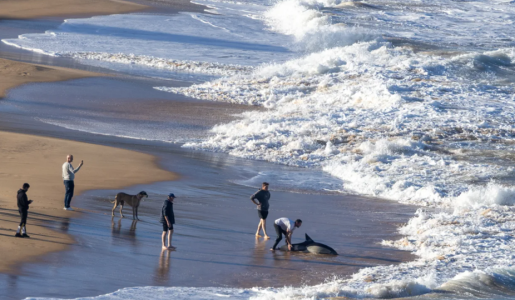Hero Turns Into Cautionary Tale: What Every Aussie Needs to Learn from This Beachside Rescue Drama!
By
- Replies 4
The Australian coastline is a place of breathtaking beauty and home to a diverse array of marine life. It's not uncommon for beachgoers to encounter wildlife, but what happens when that wildlife is in distress? A recent event on Forresters Beach, 55 km north of Sydney, turned a group of ordinary Aussies into overnight heroes when they rushed to the aid of a stranded dolphin. However, this act of bravery has sparked an important conversation about the right way to handle such situations.
David Parry, an Aussie photographer, was on the lookout for birds of prey when he witnessed the dramatic rescue. From his vantage point, he initially feared a swimmer was in trouble, but soon realized it was a dolphin that had beached itself on the sand. Parry captured the heart-stopping moments as locals braved the rough and chilly waters to help the dolphin, believed to be a short-beaked common dolphin, a species both abundant and federally protected in Australia.
The images of the soaked rescuers and the dolphin quickly made waves online, with Central Coast locals and netizens alike praising the group's quick action. Comments like 'Well done! Amazing,' and 'Thank you for saving this little one,' flooded social media, celebrating the community's spirit and the rescuers' courage.
However, despite the best intentions of these impromptu heroes, marine experts have issued a warning that should resonate with all Australians. The Organisation for the Rescue and Research of Cetaceans in Australia (ORRCA), a non-profit working with the NSW Government, cautions that beaching is often indicative of underlying health issues in marine mammals. Illness, injury from predators or ships, and ingestion of plastic or fishing gear are common reasons dolphins and whales may strand themselves on shore.
Sharon Coffee from ORRCA explains that while the desire to help is commendable, untrained attempts at rescue can do more harm than good. Without proper medical assessment and care, a returned dolphin may beach itself again, potentially leading to its demise. The process of refloating a beached dolphin is complex and can take hours, as it involves not just pushing the animal back into the water but also ensuring its muscles can function properly after the pressure exerted on its organs while stranded.
In light of this incident, it's crucial for Australians to understand the proper protocol when encountering a stranded dolphin or whale. The first step should always be to contact local authorities or organizations like ORRCA, who are trained to handle such situations. They can provide the necessary medical attention and ensure the best chance of survival for these magnificent creatures.
Australia's marine environment is a national treasure, and its protection is a shared responsibility. While the instinct to help is a testament to the Australian spirit, education and awareness are key to ensuring that our wildlife continues to thrive. If you're ever in doubt about what to do, remember that there are experts ready to assist. You can find information about who to contact in your state or territory through ORRCA or local government websites.
 We at the Seniors Discount Club salute the bravery of those who rushed to the dolphin's aid and encourage our readers to share their thoughts and experiences. Have you ever encountered marine wildlife in distress? What actions did you take? Join the conversation below and let's spread awareness about the right way to help our marine friends in need.
We at the Seniors Discount Club salute the bravery of those who rushed to the dolphin's aid and encourage our readers to share their thoughts and experiences. Have you ever encountered marine wildlife in distress? What actions did you take? Join the conversation below and let's spread awareness about the right way to help our marine friends in need.
David Parry, an Aussie photographer, was on the lookout for birds of prey when he witnessed the dramatic rescue. From his vantage point, he initially feared a swimmer was in trouble, but soon realized it was a dolphin that had beached itself on the sand. Parry captured the heart-stopping moments as locals braved the rough and chilly waters to help the dolphin, believed to be a short-beaked common dolphin, a species both abundant and federally protected in Australia.
The images of the soaked rescuers and the dolphin quickly made waves online, with Central Coast locals and netizens alike praising the group's quick action. Comments like 'Well done! Amazing,' and 'Thank you for saving this little one,' flooded social media, celebrating the community's spirit and the rescuers' courage.
However, despite the best intentions of these impromptu heroes, marine experts have issued a warning that should resonate with all Australians. The Organisation for the Rescue and Research of Cetaceans in Australia (ORRCA), a non-profit working with the NSW Government, cautions that beaching is often indicative of underlying health issues in marine mammals. Illness, injury from predators or ships, and ingestion of plastic or fishing gear are common reasons dolphins and whales may strand themselves on shore.
Sharon Coffee from ORRCA explains that while the desire to help is commendable, untrained attempts at rescue can do more harm than good. Without proper medical assessment and care, a returned dolphin may beach itself again, potentially leading to its demise. The process of refloating a beached dolphin is complex and can take hours, as it involves not just pushing the animal back into the water but also ensuring its muscles can function properly after the pressure exerted on its organs while stranded.
In light of this incident, it's crucial for Australians to understand the proper protocol when encountering a stranded dolphin or whale. The first step should always be to contact local authorities or organizations like ORRCA, who are trained to handle such situations. They can provide the necessary medical attention and ensure the best chance of survival for these magnificent creatures.
Australia's marine environment is a national treasure, and its protection is a shared responsibility. While the instinct to help is a testament to the Australian spirit, education and awareness are key to ensuring that our wildlife continues to thrive. If you're ever in doubt about what to do, remember that there are experts ready to assist. You can find information about who to contact in your state or territory through ORRCA or local government websites.
Key Takeaways
- A group of beachgoers have been hailed as heroes for helping a stranded dolphin at Forresters Beach, north of Sydney.
- Wildlife photographer David Parry captured the rescue, but experts warn against untrained attempts to help beached mammals.
- ORRCA, a non-profit organisation, explains that beaching often indicates an underlying issue, and the animal usually requires medical attention.
- The story highlights the complex process of safely refloating beached marine mammals, which can take hours and needs specialised care.








